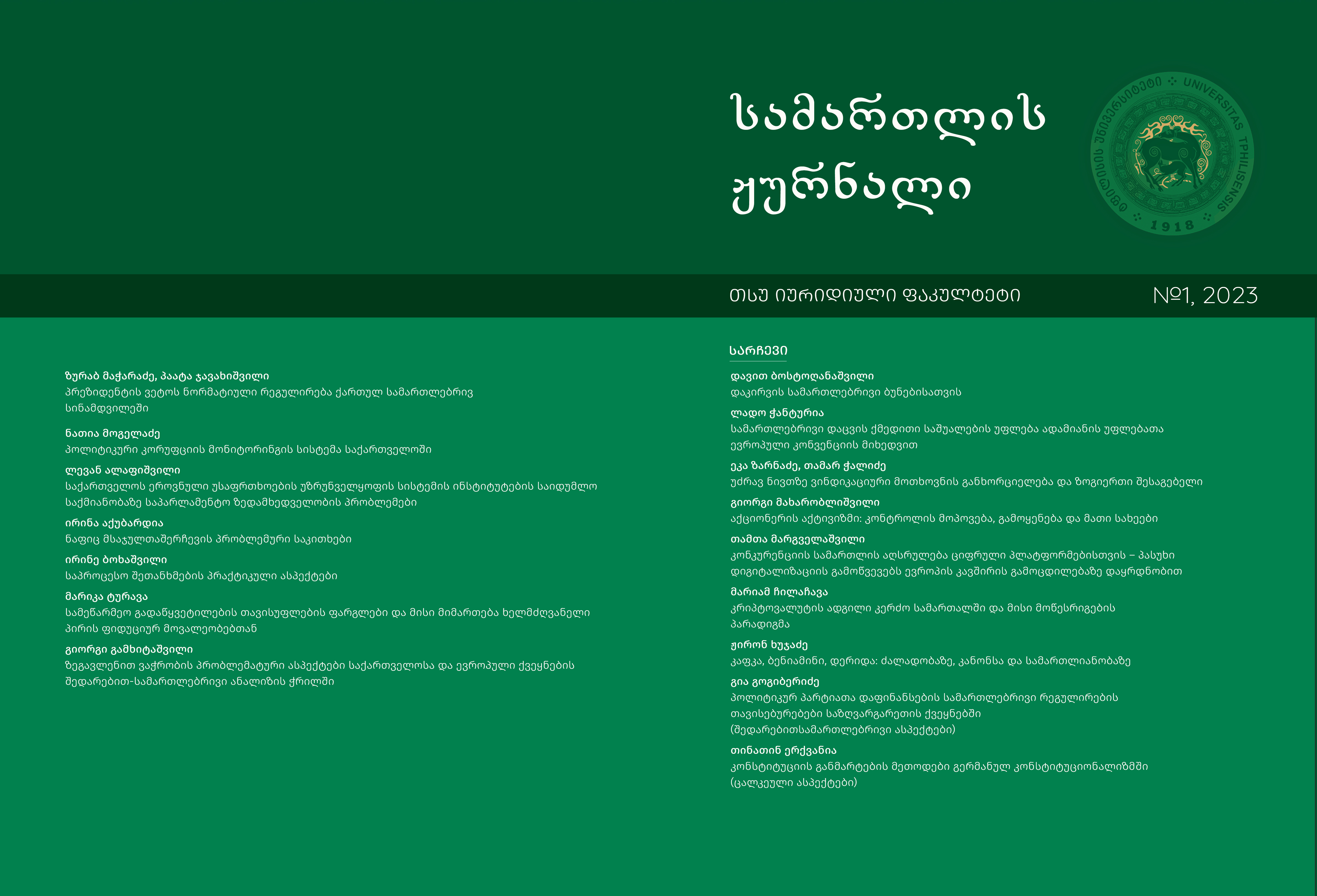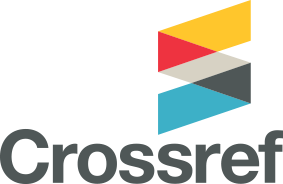კონკურენციის სამართლის აღსრულება ციფრული პლატფორმებისთვის - პასუხი დიგიტალიზაციის გამოწვევებს ევროპის კავშირის გამოცდილებაზე დაყრდნობით
DOI:
https://doi.org/10.60131/jlaw.1.2023.7063საკვანძო სიტყვები:
კონკურენცია, ევროპეიზაცია, აღსრულება, ციფრული პლატფორმა, საბაზრო ძალაუფლება, ევროკავშირი.ანოტაცია
ევროპის კავშირის (შემდგომში „ევროკავშირი“) სამართალი კომპლექსური სამართლებრივი სისტემაა, რომელიც ზეეროვნულ სამართალს კომპარატივიზმის საფუძველზე აყალიბებს.[1] ევროკავშირისთვის სამართლის ჰარმონიზაცია ერთ-ერთი ის ინსტრუმენტია, რომელიც უზრუნველყოფს ევროკავშირის შიდა ბაზრის გამართულად ფუნქციონირებას და აღწევს ევროპული ინტეგრაციის სრულყოფის იდეას, რომელიც დიდი ხანია გასცდა მის დღეს არსებულ გეოგრაფიულ საზღვრებს და მოიცვა „მესამე მსოფლიო“.[2] შესაბამისად, კონკურენციის სამართლის ჰარმონიზაცია არამხოლოდ ევროკავშირის წევრი სახელმწიფოებისთვის არის მცდელობა, შემუშავდეს ერთიანი სისტემა ეფექტიანი კონკურენციის უზრუნველსაყოფად, არამედ ის საბაზისო იარაღია ევროკავშირში გაწევრიანების გზაზე მდგომი ქვეყნებისთვის.
წინამდებარე სტატია ამ რამდენიმე მნიშვნელოვან საკითხზეა ორიენტირებული. ის ფოკუსირდება რა ევროკავშირის კონკურენციის სამართლის აღსრულების ჰარმონიზაციის საწყისებზე, შედარებითი მეთოდის საფუძველზე წარმოაჩენს ერთი იურისდიქციიდან მეორეში ციფრული პლატფორმებისთვის კონკურენციის აღსრულების მექანიზმების სამართლებრივი ტრანსფერის შესაძლებლობებს. აღნიშნული ნაშრომის კვლევის ობიექტი, პირველ ყოვლისა, არის ევროკავშირის ის ნორმატიული და პრეცედენტული სამართლის ტენდენციები, რომელებიც დიგიტალიზაციის უწყვეტ პროცესში ციფრული პლატფორმებისთვის სამართლიანი კონკურენციის აღსრულებას უზრუნველყოფენ. მეორე მხრივ, მისი შეფასების საგანს წარმოადგენს ციფრული პლატფორმებისთვის კონკურენციის სამართლის აღსრულების ინსტრუმენტების ჰარმონიზაციის პერსპექტივები საქართველოში.
[1] Vranken M., Fundamentals of European civil law. Blackstone Press, London, 1997, 14.
[2] გამოყენებულია ევროკავშირის არაწევრი ქვეყნის აღსანიშნავად. მოქალაქეებს არ აქვს ევროკავშირის ტერიტორიაზე თავისუფალი გადაადგილების უფლება ევროკავშირის რეგულაცია 2016/399 (შენგენის კოდექსი) 2(5)-ე მუხლის მიხედვით.
წყაროები
Law of Georgia "On Competition", Legislative Gazette, 08/05/2012.
Order of the Chairman of the Competition Agency No. 40 of October 28, 2020 "On approval of the procedure and procedure for investigating the case," 04/11/2020.
The decision of the Constitutional Court of Georgia in the case No. 1/1/655, "SKS" LLC against the Parliament of Georgia, April 18, 2019;
Decision of the Constitutional Court of Georgia in case N2/11/747, LLC "Giganti Security" and LLC "Security Company Tigonis" against the Parliament of Georgia and the Minister of Internal Affairs of Georgia, December 14, 2018;
Adamia G., Constitutional Aspects of Economic Competition, Journal of Constitutional Law 2, 2020, 99 (in Georgian).
Adamia G., Prospects of private enforcement of competition law on the example of abuse of a dominant position in Georgia, Georgian-German Journal of Comparative Law, No. 10, 2020, 22-42 (in Georgian).
Baker J.B., The Antitrust Paradigm, Harvard University Press, 2019, 26-31, 82-89.
Cavanagh E., Antitrust Remedies Revisited, Oregon Law Review 84, 2015, 185, https://scholarsbank.uoregon.edu/xmlui/bitstream/handle/1794/4643/841cavanagh.pdf?sequence=1&isAllowed=y [09.02.2023].
Colomo P.I., What Can Competition Law Achieve in Digital Markets? An Analysis of the Reforms Proposed, 2020, 12, https://papers.ssrn.com/sol3/papers.cfm?abstract_id=3723188 [09.02.2023].
Competition and Markets Authority, The CMA’s Digital Markets Strategy, 2019, https://assets.publishing.service.gov.uk/government/uploads/system/uploads/attachment_data/file/814709/cma_digital_strategy_2019.pdf [09.02.2023].
European Commission, Directorate-General for Competition, Montjoye Y., Schweitzer H., Crémer J., Competition Policy for the Digital Era, Publications Office, 2019, 20, 22-26, 33, 67 https://data.europa.eu/doi/10.2763/407537 [09.02.2023].
Furman Report of the Digital Competition Expert Panel, Unlocking digital competition Report of the Digital Competition, 2019, paragraph 1.106.
Genai P., An update on Android for search providers in Europe, The Keyword, 2019.
Geradina D., Katsifisd D., Strengthening effective antitrust enforcement in digital platform markets, European Competition Journal, Vol. 18, No. 2, 2022, 370, 376, 380-381, 357, 359.
Inozemtsev M. I., Sidorenko E.L Khisamova Z. I., The Platform Economy Designing a Supranational Legal Framework, Palgrave Macmillan, 2022.
Kuenzler A., Competition Law Enforcement on Digital Markets - Lessons from Recent EU Case Law Journal of Antitrust Enforcement, 2019, Vol. 7, 249–278.
Lemley M. A., Feldman R., Atomistic Antitrust, William and Mary Law Review, Vol. 63, Issue 6, 2021, 1869.
Loladze T., International Commitments and Cooperation in the Field of Competition, First International Scientific-Practical Conference, Competition Policy: Modern Trends and Challenges, Proceedings, 2017, 148 (in Georgian).
Malinauskaite J., Harmonisation of EU Competition Law Enforcement, Springer International Publishing AG, 2019, 11.
Margvelashvili T., Fostering E-commerce in the light of the Deep and Comprehensive Free Trade Area (DCFTA): A Case Study of Georgia, Law Journal No. 1, 2020, 148 (in Georgian).
Panzar J.C., William J Baumol W.J., Willig R., Contestable markets: An Uprising in the Theory of Industry Structure, The American Economic View 73, 1982, 491.
Report of the Competition Agency of Georgia, 2019, https://admin.competition.ge/uploads/ba93e69448d1440f806dd21c5a19edd9.pdf [09.02.2023].
Ritter C., How Far Can the Commission Go When Imposing Remedies for Antitrust Infringements? Journal of European Competition Law & Practice 3, 2016, 12.
Schweitzer H., Welker R., Competition Policy for the Digital Era, CPI Antitrust Chronicle, 2019, 3-4.
Shelanski H.A., Information, Innovation, and Competition Policy for the Internet, University of Pennsylvania Law Review 161, 2013, 1663.
Stigler Committee on Digital Platforms, Policy brief summarising the main concerns of digital platforms and provides a viable path to address the identified concerns, Final Report, 2019, 34-35, 37 shorturl.at/gjsP0 [09.02.2023].
The decision of the State Competition Agency "Refusal to start an investigation based on the application of the Competition Authority and Consumer Protection Center N01/1090 of November 15, 2016" 09/01/2017. https://admin.competition.ge/uploads/bab070eafe7a4cfb824dddeaaa0d1b81.pdf [09.02.2023].
Treaty on the Functioning of the European Union, Official Journal C 326 , 26/10/2012 P. 0001 – 0390, https://eurlex.europa.eu/legalcontent/EN/TXT/?uri=celex%3A12012E%2FTXT [09.02.2023].
Vranken M., Fundamentals of European civil law. Blackstone Press, London, 1997, 14.
Commission Regulation (EU) No 330/2010 on the application of Article 101(3) of the Treaty on the Functioning of the European Union to categories of vertical agreements and concerted practices, 20/04/2010.
Council Regulation (EC) No 1/2003 on The Implementation of The Rules on Competition Laid Down in Articles 81 And 82 of the Treaty, 16/12/2002;
Case C-56/64, Consten and Grundig v Commission of the European Economic Community, [1966], ECR 299.
Case C-62/86, AKZO Chemie BV v Commission of the European Communities, [1991], ECR 286.
Case C-230/16 Coty Germany GmbH v Parfu¨merie Akzente GmbH [2017] ECLI:EU:C:2017:941).
Case AT.39740, Google Search (Shopping), Commission Decision, [2017].
Case C-228/18, Gazdasági Versenyhivatal v Budapest Bank Nyrt. and Others, [2020].
ჩამოტვირთვები
გამოქვეყნებული
როგორ უნდა ციტირება
გამოცემა
სექცია
ლიცენზია

ეს ნამუშევარი ლიცენზირებულია Creative Commons Attribution-ShareAlike 4.0 საერთაშორისო ლიცენზიით .









